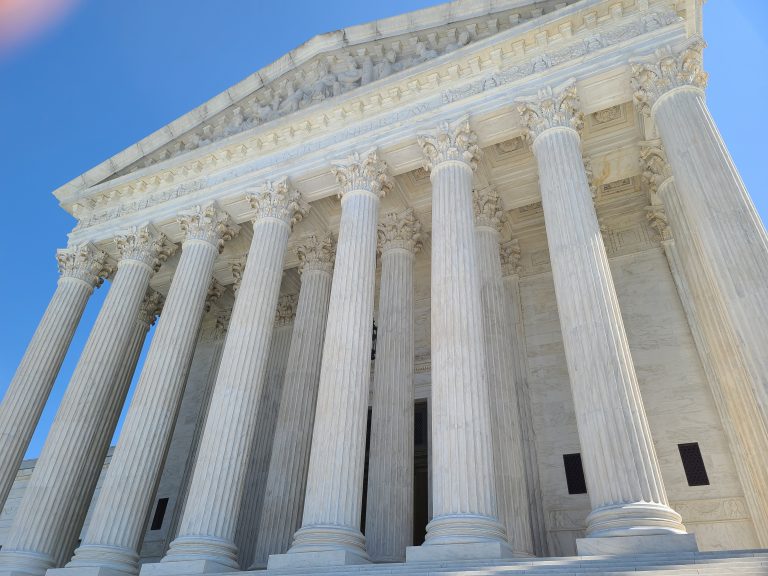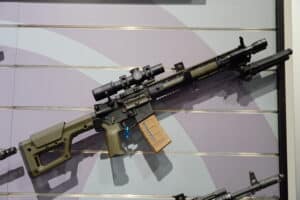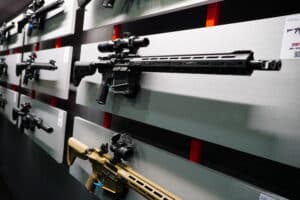American gun makers are not liable for cartel violence carried out with their products in Mexico.
That’s the conclusion of a unanimous ruling the Supreme Court of the United States (SCOTUS) handed down on Thursday. The Court ruled Mexico’s government failed to show the actions of Smith and Wesson or the other named gun companies aided and abetted Mexican criminals in their efforts to illegally obtain guns. It concluded that meant the country’s $10 billion liability suit was barred from moving forward by the Protection of Lawful Commerce in Arms Act (PLCAA), which prevents suits designed to hold gun companies responsible for the criminal acts of third parties they weren’t directly involved in.
“The kinds of allegations Mexico makes cannot satisfy the demands of the statute’s predicate exception,” Justice Elana Kagan wrote for the Court in Mexico v. Smith and Wesson. “That exception permits a suit to be brought against a gun manufacturer that has aided and abetted a firearms violation (and in so doing proximately caused the plaintiff’s harm). And Mexico’s complaint, for the reasons given, does not plausibly allege such aiding and abetting. So this suit remains subject to PLCAA’s general bar: An action cannot be brought against a manufacturer if, like Mexico’s, it is founded on a third party’s criminal use of the company’s product.”
This is the first time SCOTUS has ruled on the PLCAA and the exceptions to it. The ruling will make it more difficult for people to bring liability suits against gun makers unless they can show the gun makers were active participants in causing the harm. It’s a significant win for the gun industry, which has faced a renewed effort by gun-control activists to circumvent PLCAA protections in the wake of 2022’s settlement between the defunct Remington Arms Company and Sandy Hook families.
The case made its way to the Supreme Court after a panel on the First Circuit Court of Appeals revived the suit last January. That panel unanimously ruled Mexico’s aiding and abetting claim was viable because it was possible for American gun makers to foresee their firearms would continue to be used in cartel crimes.
“We agree that the PLCAA’s limitations on the types of lawsuits that may be maintained in the United States apply to lawsuits initiated by foreign governments for harm suffered outside the United States,” Judge William J. Kayatta wrote in Mexico v. Smith and Wesson. “However, we also hold that Mexico’s complaint plausibly alleges a type of claim that is statutorily exempt from the PLCAA’s general prohibition. We therefore reverse the district court’s holding that the PLCAA bars Mexico’s common law claims, and we remand for further proceedings.”
Smith and Wesson and the other gun companies named in the suit then appealed to the Supreme Court.
The case primarily deals with Mexico’s claim that the American companies sell firearms in ways that, while legal under American laws, contribute to illicit trafficking of firearms into Mexico. It also blamed the companies for continuing to make certain classes of firearms, such as the AR-15, and individual models, including some featuring Spanish names or historical figures, that Mexico believes appeal to cartel members. Mexico argued the companies’ continued sale of those guns and their decision not to force more restrictive sales practices on downstream retailers despite a general knowledge that some of the guns they make end up being trafficked to Mexican cartels makes them liable for the billions in damages caused by cartel violence.
SCOTUS rejected that formulation, though.
Justice Kagan, writing for the majority, said PLCAA protections could be pierced by an aiding and abetting crime. However, she wrote that Mexico had failed to clear the bar for showing the gun companies aided and abetted cartels or their arms suppliers. She cited two recent precedents. In one, a pharmacy was found to have aided and abetted an over-prescribing doctor by specifically increasing supply to the doctor despite an understanding he was likely breaking the law. In another, Twitter was found not to have aided and abetted an ISIS plot because it had not provided the perpetrators with any specialized attention beyond making their social media platform generally available.
She said Mexico’s claims fall flat in light of those cases.
“Viewed against the backdrop of that law, Mexico’s complaint does not plausibly allege that the defendant manufacturers aided and abetted gun dealers’ unlawful sales of firearms to Mexican traffickers,” Kagan wrote. “We have little doubt that, as the complaint asserts, some such sales take place—and that the manufacturers know they do. But still, Mexico has not adequately pleaded what it needs to: that the manufacturers ‘participate in’ those sales ‘as in something that [they] wish[] to bring about,’ and ‘seek by [their] action to make’ succeed.”
Kagan noted that Mexico doesn’t even allege the gun companies treated any gun dealers differently from others.
“[T]he complaint repeatedly states that the manufacturers treat rogue dealers just the same as they do law-abiding ones—selling to everyone, and on equivalent terms,” she wrote. “So the complaint, even if taken at face value, would stretch the bounds of our caselaw.”
She went further and explained that Mexico hadn’t even established that Smith and Wesson or the other gun makers had specific knowledge of who is and isn’t a suspicious gun dealer, emphasizing that the manufacturers don’t even sell directly to retailers.
“[W]e cannot take the allegation here at face value, because Mexico has not said enough to make it plausible,” Kagan wrote. “In asserting that the manufacturers intentionally supply guns to bad-apple dealers, Mexico never confronts that the manufacturers do not directly supply any dealers, bad-apple or otherwise. They instead sell firearms to middlemen distributors, whom Mexico has never claimed lack independence. Given that industry structure, Mexico’s complaint must offer some reason to believe that the manufacturers attend to the conduct of individual gun dealers, two levels down. But it does not so much as address that issue. And even assuming the manufacturers know everything the distributors know, the complaint still would not adequately support the charge that they have identified the bad-apple dealers. Mexico does not itself name those dealers, though they are the ostensible principals in the illegal transactions claimed. Nor does Mexico provide grounds for thinking that anyone up the supply chain—whether manufacturer or distributor—often acquires that information.”
Kagan concluded that ‘a manufacturer of goods is not an accomplice to every unaffiliated retailer whom it fails to make follow the law.’
The Court also dismissed the idea that gun companies were making guns designed to specifically appeal to cartel members. Kagan said the claim adds “nothing of consequence” to Mexico’s case.
“As noted above, Mexico here focuses on the manufacturers’ production of ‘military style’ assault weapons, among which it includes AR–15 rifles, AK–47 rifles, and .50 caliber sniper rifles,” Kagan wrote. “But those products are both widely legal and bought by many ordinary consumers. (The AR–15 is the most popular rifle in the country.) The manufacturers cannot be charged with assisting in criminal acts just because Mexican cartel members like those guns too.”
The Court came to the same conclusion about guns that feature Spanish names or historical icons.
“Those guns may be ‘coveted by the cartels,’ as Mexico alleges; but they also may appeal, as the manufacturers rejoin, to ‘millions of law-abiding Hispanic Americans,'” Kagan wrote.
Ultimately, SCOTUS determined Mexico’s suit is barred by the PLCAA. In fact, it said the suit is exactly the kind of case the PLCAA was created to prevent.
“And that conclusion, we note, well accords with PLCAA’s core purpose,” Kagan wrote. “Recall that Congress enacted the statute to halt a flurry of lawsuits attempting to make gun manufacturers pay for the downstream harms resulting from misuse of their products. In a ‘findings’ and ‘purposes’ section, Congress explained that PLCAA was meant to stop those suits—to prevent manufacturers (and sellers) from being held ‘liable for the harm caused by those who criminally or unlawfully misuse firearm[s].’ Mexico’s suit closely resembles the ones Congress had in mind: It seeks to recover from American firearms manufacturers for the downstream damage Mexican cartel members wreak with their guns.”
Justices Clarence Thomas and Ketanji Brown-Jackson wrote short concurances as well.
Justice Jackson used her concurance to emphasize that, while there are exceptions that make liability suits against gun companies viable under the PLCAA, Mexico’s suit boiled down to an attempt to force new national gun restrictions via the judiciary rather than America’s legislative branches.
“Devoid of nonconclusory allegations about particular statutory violations, Mexico’s lawsuits seek to turn the courts into common-law regulators,” she wrote. “But Congress passed PLCAA to preserve the primacy of the political branches—both state and federal—in deciding which duties to impose on the firearms industry. Construing PLCAA’s predicate exception to authorize lawsuits like the one Mexico filed here would distort that basic design.”
Meanwhile, Justice Thomas argued in his concurance that courts should look at adopting a strict view of what actions actually fit the exemptions to the PLCAA’s liability shield.
“It seems to me that the PLCAA at least arguably requires not only a plausible allegation that a defendant has committed a predicate violation, but also an earlier finding of guilt or liability in an adjudication regarding the ‘violation,'” he wrote. “Allowing plaintiffs to proffer mere allegations of a predicate violation would force many defendants in PLCAA litigation to litigate their criminal guilt in a civil proceeding, without the full panoply of protections that we otherwise afford to criminal defendants. And, these defendants might even include ones who were cleared in an earlier proceeding, such as through a non-charge decision or a not-guilty or not-liable verdict. Such collateral adjudication would be at best highly unusual, and would likely raise serious constitutional questions that would counsel in favor of a narrower interpretation.”
UPDATE 6-5-2025 1:10 PM EASTERN: This piece has been updated with more detail from the Supreme Court’s ruling.







Only Members can view comments. Become a member today to join the conversation.